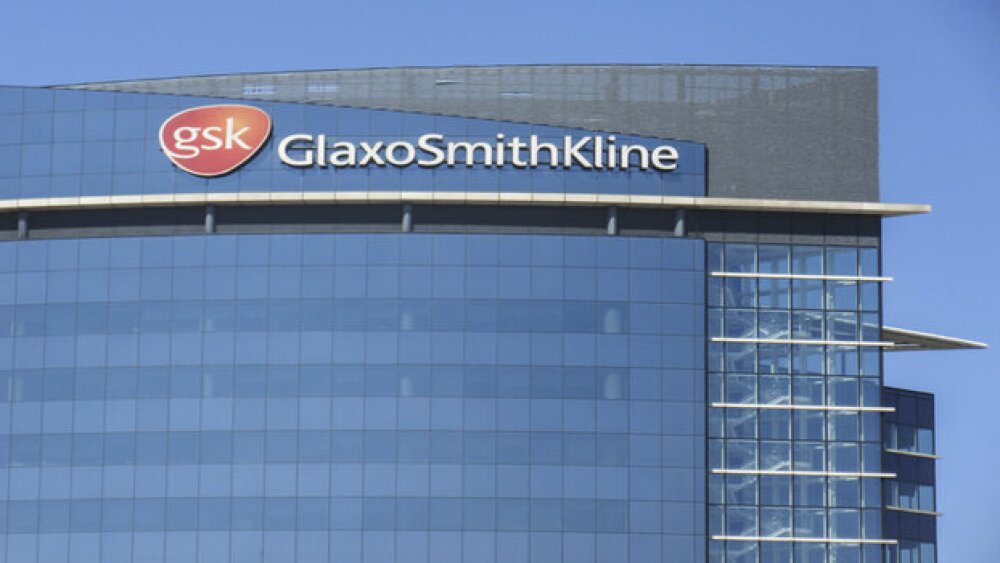While GlaxoSmithKline is anticipating a slower uptake of respiratory syncytial virus vaccine Arexvy, CEO Emma Walmsley said Wednesday the company is pinning much of its growth on the vaccine’s performance.
Pictured: GSK sign at its headquarters in London/iStock, William Barton
Despite being the world’s first approved vaccine against respiratory syncytial virus infection, GSK expects a slower initial rollout for Arexvy, CEO Emma Walmsley said during a second-quarter earnings briefing Wednesday, as reported by Reuters.
This is in comparison to its blockbuster shingles shot Shingrix, which claimed the spot as GSK’s top-selling asset in the second quarter, according to the company’s earnings report. Shingrix brought in more than $1.1 billion during the second quarter, representing a 20% increase at constant exchange rates. The FDA first approved Shingrix in October 2017.
Shingrix’s revenue growth was driven by expanding global markets and better immunization rates in the U.S., which jumped from 30% at the end of 2022 to 32% by the end of this year’s first quarter, according to GSK’s second-quarter earnings announcement. Shingrix outpaced the company’s other bestsellers, including asthma medication Trelegy Ellpita (fluticasone furoate/umeclidinium/vilanterol inhalation powder) and HIV drug Dovato (dolutegravir/lamivudine).
In Wednesday’s earnings call, GSK touted total revenue of nearly $9.3 billion for the second quarter, a figure that surpassed analyst expectations. The company Wednesday also raised its financial guidance for the rest of the year, expecting its revenue to increase 8% to 10%, which was previously pegged at 6% to 8%.
GSK also now estimates its earnings per share to grow 14% to 17%, up from the previous projection of 12% to 15%.
The strong second-quarter results and the more optimistic outlook is due to the impressive performance of its shingles and HIV businesses—and a landmark regulatory win. In May 2023, the FDA authorized GSK’s Arexvy for the prevention of respiratory syncytial virus (RSV)-associated lower respiratory tract disease in people aged 60 years and above. Arexvy was also approved in the European Union in June.
Arexvy is the first RSV vaccine to be authorized for use, nabbing GSK the victory in a very tight race. Pfizer, its closest competitor, also scored an FDA approval for its shot Abrysvo a few weeks later.
GSK is pinning much of its hope on Arexvy, whose FDA approval came just in time for the 2023/2024 RSV season. The company estimates that nearly 80 million older adults in the U.S. could receive an RSV shot for the first time and is preparing Arexvy’s launch to meet this demand. The RSV vaccine will launch in the EU in the third quarter.
However, it wasn’t all good news during Wednesday’s earnings report for GSK. Despite a positive opinion from the Committee for Medicinal Products for Human Use (CHMP) for Jesduvroq (daprodustat) for the treatment for symptomatic anemia in chronic kidney disease (CKD), GSK will hold off on launching the product in Europe and not pursue applications in other territories.
The decision not to commercialize in Europe was made “due to the significant reduction in the size of the opportunity” following the CHMP’s decision to not recommend the treatment for patients who are not dependent on dialysis, according to GSK’s news release. The availability of other treatments for anemia in CKD in Europe also contributed to this decision.
Tristan Manalac is an independent science writer based in metro Manila, Philippines. He can be reached at tristan@tristanmanalac.com or tristan.manalac@biospace.com.






